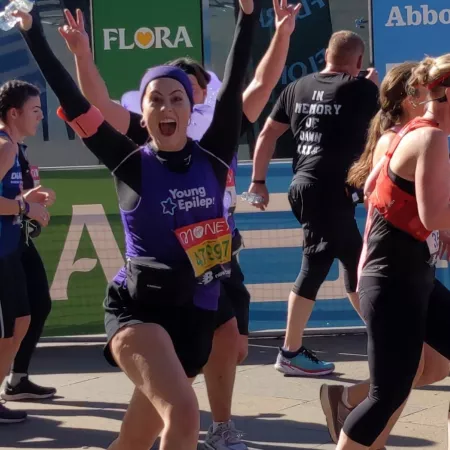
As a sports coach, I am heavily involved in physical activity for both myself and the children I work with – but how do I find a healthy balance between exercise and recognising my epilepsy?
There are a few important factors to consider when exercising with epilepsy…
1. Eating enough
It is so important to ensure your body is energised enough to do exercise. A trigger for my epilepsy is not eating enough and tiring my body out. This can be a huge risk to me and so I always ensure that I have eaten before I do any high impact exercise. I have things such as bananas and protein bars with an energy drink. Nutrition is extremely important when exercising as we require to have enough calories and food groups in our diet. Don’t be afraid of the right carbs and sugar as they are our friend when exercising. Without food, we won’t be able to operate properly. Remember, a car cannot run without fuel!
2. Finding alternatives
When I was young, I loved riding my bike. Being able to go outside with friends and family while exercising was so enjoyable, however with epilepsy it is not suggested to ride a bike. When I was diagnosed with my condition I was extremely upset, but I found an alternative. As I love being outside while exercising, I swapped cycling for brisk walking. This still allowed me to get fresh air, while also spend time with friends and family. In addition to this, if you are more focused on the exercise part of cycling, stationary bikes at the gym are even more effective with the adjustable settings so you can challenge yourself. Do not ever feel like you must compensate on exercise because of epilepsy, there is always an alternative.
3. Understanding your limits
If you are new to regular, harder exercise, you may want to pace yourself to begin with. Achieving fitness goals is fantastic, however we need to understand our limits when having conditions such as epilepsy. Our bodies naturally tire after excessive exercise, and with fatigue being one of the major triggers, you need to set your limits and go at your own pace. For example, you could start with walking regularly, and then further that exercise into a longer, brisker walk. If you feel capable enough to do high intensity, then ensure you are hydrated and have a set routine. Having a set routine for each workout allows you to have structure when exercising and understand the areas you’d like to work on most. For example, if you’d like to work on muscle toning and strengthening, then weights and some light cardio will be most effective to begin with. Never be afraid to build up your exercise, but always remember to find what is comfortable and safest for you.
4. Allow your body to rest
Rest is a crucial part of exercise. Our body will recognise when we have over-worked and need a break – if this is the case, listen to your body. Your body will always know when it has reached its limit and needs to recover. Muscle recovery is a key part of progressing with exercise. If you are aiming to build up fitness or focus on your health, you must ensure you take at least 1 rest day a week. From my personal experience, doing high intensity training everyday can be tiresome and dangerous for my health. It can increase the risk of serious fatigue and a seizure, so always make sure to find a time to rest and let you muscles recover.
5. Enjoy the exercise!
If you ever start to feel as if you must push yourself to do exercise and don’t have the added benefit of feeling good or happy, this is a sign that you must pace yourself. Although exercise is great for our mental and physical health, it is equally as important to feel happy and willing to do it. This is also in relation to being energised through food and drink, so by making sure you have the correct nutrients beforehand will help you to feel happier when exercising. Remember, exercise should be enjoyable, not a chore.
Exercising with epilepsy comes with its difficulties, but ensure you eat enough, never compensate, understand you limits, and most importantly, enjoy it.Abbey




